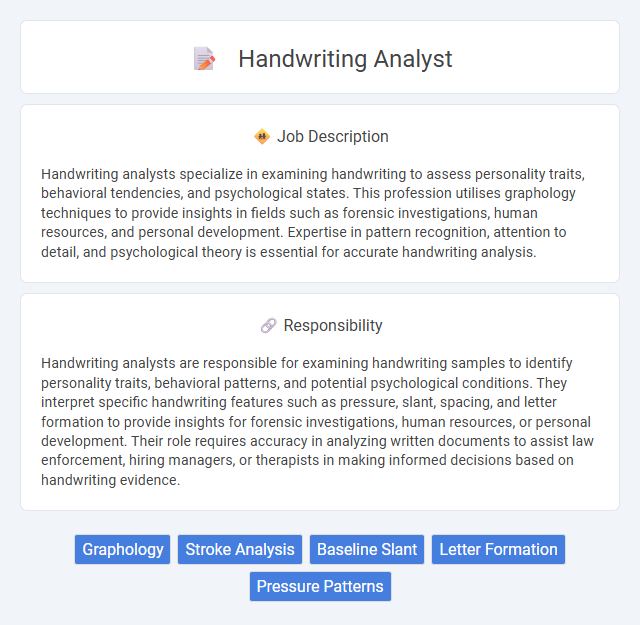
Handwriting analysts specialize in examining handwriting to assess personality traits, behavioral tendencies, and psychological states. This profession utilises graphology techniques to provide insights in fields such as forensic investigations, human resources, and personal development. Expertise in pattern recognition, attention to detail, and psychological theory is essential for accurate handwriting analysis.
Individuals with strong attention to detail and analytical thinking are more likely to excel as handwriting analysts. Those who are patient, observant, and comfortable working independently may find this career suitable. People struggling with focus or lacking interest in psychological patterns may face challenges in this role.
Qualification
Handwriting analysts require strong skills in graphology, including expertise in interpreting handwriting traits and patterns to assess personality or behavior. A background in psychology or forensic science enhances their ability to analyze handwriting accurately and provide insightful evaluations. Certification from recognized graphology institutions and experience with document examination are essential qualifications for professional credibility.
Responsibility
Handwriting analysts are responsible for examining handwriting samples to identify personality traits, behavioral patterns, and potential psychological conditions. They interpret specific handwriting features such as pressure, slant, spacing, and letter formation to provide insights for forensic investigations, human resources, or personal development. Their role requires accuracy in analyzing written documents to assist law enforcement, hiring managers, or therapists in making informed decisions based on handwriting evidence.
Benefit
A career as a handwriting analyst likely offers the benefit of gaining unique insights into personality traits and behavioral tendencies, which can be valuable in various fields such as criminal investigations, recruitment, and psychological assessments. Working in this role may also provide opportunities for continuous learning and specialization in forensic document examination. The job might offer flexible work environments, potentially allowing analysts to work independently or as part of law enforcement and legal teams.
Challenge
A handwriting analyst may encounter significant challenges in accurately interpreting subtle nuances and variations in handwriting styles. The probability of misinterpretation exists due to the subjective nature of analyzing personal handwriting characteristics. Continuous skill refinement and cross-verification with other data sources likely become essential to overcome these challenges effectively.
Career Advancement
Handwriting analysts leverage expertise in graphology to assess personality traits and behavioral patterns, often advancing into roles such as forensic specialists, human resources consultants, or psychological researchers. Gaining professional certifications and experience with diverse handwriting samples enhances credibility and opens opportunities in legal, corporate, or counseling sectors. Mastery of advanced analytical software and continuous education in psychology and criminology further propels career growth in this niche field.
Key Terms
Graphology
Handwriting analysts specialize in graphology, the study of handwriting patterns to assess personality traits and behavioral tendencies. By examining strokes, pressure, spacing, and letter formation, they provide insights useful in psychological profiling, recruitment, and forensic investigations. Advanced knowledge of graphology allows analysts to identify underlying emotions and cognitive states through personalized handwriting samples.
Stroke Analysis
Handwriting analysts specializing in stroke analysis meticulously examine the pressure, direction, and flow of each pen stroke to uncover personality traits and emotional states. This detailed scrutiny helps detect inconsistencies and subconscious signals that reveal behavioral tendencies and mental conditions. Precision in stroke analysis enhances the accuracy of forensic investigations and psychological evaluations in professional handwriting analysis.
Baseline Slant
A handwriting analyst specializes in interpreting baseline slant to assess an individual's emotional stability and mood fluctuations. A consistently ascending baseline slant indicates optimism and ambition, while a descending slant may reveal fatigue or discouragement. Precise evaluation of baseline slant provides critical insights into personality traits and unconscious feelings reflected in handwriting samples.
Letter Formation
Handwriting analysts specialize in examining letter formation to interpret personality traits and psychological conditions. Precise analysis of letter size, slant, and pressure reveals individual emotional states and behavioral tendencies. Expertise in recognizing unique handwriting patterns enables accurate profiling in forensic and psychological contexts.
Pressure Patterns
Handwriting analysts assess pressure patterns to interpret an individual's emotional intensity and psychological state, as heavier pressure often indicates strong emotions or determination, while lighter strokes may suggest sensitivity or low energy. These pressure variations provide critical insights into personality traits, stress levels, and behavioral tendencies. Mastery in detecting subtle differences in pressure enhances the accuracy of handwriting analysis for forensic or psychological evaluations.
 kuljobs.com
kuljobs.com